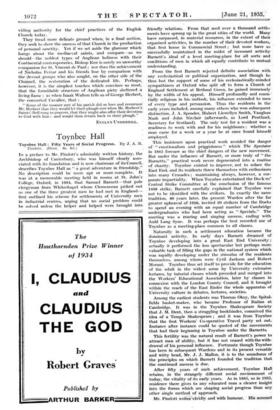Toynbee Hall
Toynbee Hall : Fifty Years of Social Progress. By J. A. R.
IN a preface to Mr. Pimlott's admirably written history, the Archbishop of Canterbury, who was himself closely asso- ciated with its foundation and is now chairman of its Council, describes Toynbee Hall as " a great adventure in friendship." No description could be more apt or more complete. It' was at a memorable meeting held in rooms at St. John's College, Oxford, in 1884, that Samuel Barnett—that pale clergyman from Whitechapel whom Clemenceau picked out as one of the three greatest men he had met in England— first outlined his scheme for settlements of University men in industrial centres, urging that no social problem could be solved unless the helper and helped were brought into. friendly relations. From that seed over a thousand settle- ments have sprung up in the great cities of the world. Many have surpassed, in material resources, in the extent of their organized activities, in the number of their devoted workers, that first home in Commercial Street ; but none have so successfully maintained in the midst of incessant activity Barnett's ideal of a level meeting-place for all sorts and conditions of men in which all equally contribute to mutual' understanding.
From the first Barnett rejected definite association with any ecclesiastical or political organization, and though he thus lost the support of some of his ecclesiastically-minded sympathizers at Oxford who split off to form a Church of England Settlement at Bethnal Green, he gained immensely by the width of his appeal. Himself profoundly and essen- tially religious in his outlook, his influence extended to men: of every type and persuasion. Thus the residents in the' early years included, among many others who won subsequent distinction, J. A. Spender, Hubert Llewellyn Smith, Vaughan Nash and John Sinclair (afterwards, as Lord Pentland, Secretary for Scotland). The only test for a resident was a readiness to work with and for his neighbours ; whether a man came for a week or a year he at once found himself- employed.
This insistence upon practical work avoided the danger' of " emotionalism and priggishness " which The Spectator in 1885 foresaw as the chief dangers of the new movement. But under the influence of Barnett, or more truly of " the Barnetts," practical work never degenerated into a routine of charity. Toynbee existed to improve, not to solace the East End, and its residents threw themselves with enthusiasm into many Crusades ; maintaining always, however, a cor- ' porate impartiality. When Toynbee entertained the Dock ars' Central Strike Committee at the conclusion of the famous 1889 strike, Barnett carefully explained that Toynbee was, not to be identified with the strikers. In exactly the same tradition, 40 years later, the present Warden after the far greater upheaval of 1926, invited 20 strikers from the Docks to spend an evening with an equal number of Cambridge undergraduates who had been acting as " Specials." The meeting was a rbaring and singing success, ending with Auld Lang Syne. It was perhaps the best recorded use of Toynbee as a meeting-place- common to all classes.
Naturally in such a settlement education became the dominant activity. In early days Barnett dreamed of Toynbee developing into a great East End University ; actually it performed the less spectacular but perhaps more valuable task of filling the gaps in the national system which was rapidly developing under the stimulus 'of the residents themselves, among whom were Cyril Jackson and Robert Morant. Toynbee thus set itself to provide for the education of the adult in the widest sense by University extension lectures, by tutorial classes which preceded and merged into the Workers' Educational Association, later by classes in connexion with the London County Council, and it brought within the reach of the -East Ender the whole apparatus of University culture in debates, lectures, societies.
Among the earliest students was Thomas Okey, the Spits!. fields basket-maker, who became Professor of Italian at Cambridge. It was in the Toynbee Shakespeare Society that J. M. Dent, then a struggling bookbinder, conceived the idea of a Temple Shakespeare ; and it was from Toynbee that the first Workers' Co-operative Travel party set out. Instance after instance could be quoted of the movements that had their beginning in Toynbee under the Bametts.
This fertility was the natural result of Barnett's power to attract men of ability, but it has not ceased with the with- drawal of his personal influence. Fortunate though Toynbee has been in subsequent Wardens and in its present versatile and witty head, Mr. J. J. Mallon, it is to the soundness of the principles on which Barnett founded the tradition that the continued success is due.
After fifty years of such achievement, Toynbee Hall retains, in the strangely different social environment of today, the vitality of its early years. As in 1885, so in 1935, residence there gives to any educated man a clearer insight into the forces which are shaping social progress than any other single method of approach.
Mr. Pimlott writes' vividly and with humour. His account








































 Previous page
Previous page